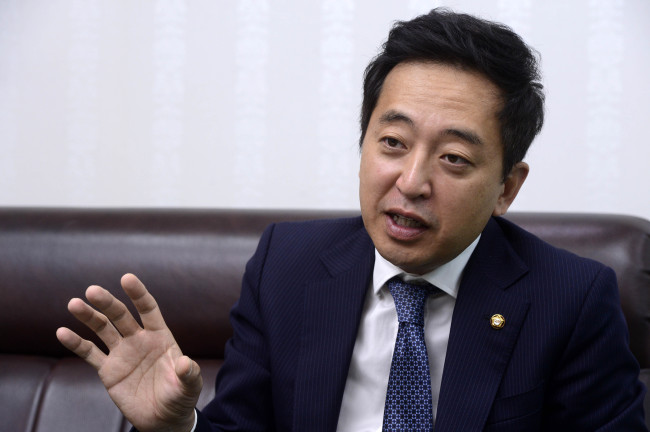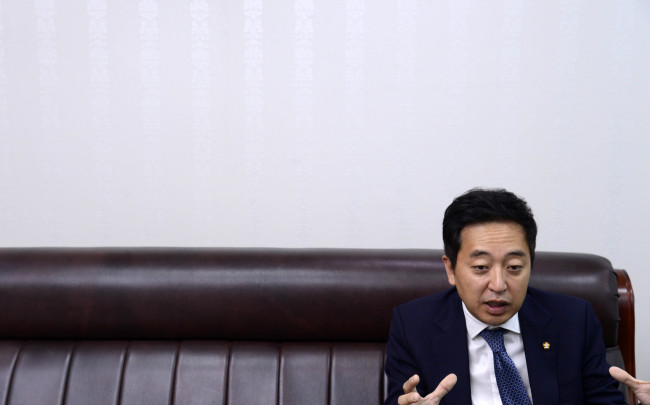[HERALD INTERVIEW] Youths are solution to faltering democracy: Lawmaker
Liberal Minjoo Party's Keum aims to overhaul criminal law, prevent prosecutors' abuse of power
By Yeo Jun-sukPublished : June 16, 2016 - 17:25
One of the most talked-about campaign ads in the last general election featured a candidate mimicking the main character of “House of Cards,” a popular U.S. show depicting the behind-the-scenes power struggle in the world of politics.
In a parody video clip that went viral, then-candidate Keum Tae-sup plays Frank Underwood, a Machiavellian politician played by actor Kevin Spacey. As the main theme music of the show plays in the background, Keum exchanges text messages with one of his campaigners who tells him that they have waited long enough for him to announce his election bid.
Then, a man wearing a horse-head mask – a camouflage that is widely used for humorous effect and symbolizes anonymity -- appears next to Keum. In follow-up social media postings, the man who donned the mask turns out to be Keum’s actual son, who went on to play a major role in the social media campaign for the now-elected first-term lawmaker of The Minjoo Party of Korea. (You can see the clip here: twitter.com/gtaeboy/status/715688205811515392)
The college student son’s playful, first-persona campaign postings catered to young constituents and boosted Keum’s image as a young crusader amid outdated politics -- the key vision maintained by the former prosecutor and lawyer who has now become the representative of Gangseo-gu, Seoul, for the 20th National Assembly.
“In order to attract young people into politics, we need to offer them roles that can make full use of their strengths,” said Keum in his office at the Assembly during an interview with The Korea Herald.
“Most young people joining election campaigns and political groups have ended up doing miscellaneous tasks such as serving coffee and making photocopies. Since they come here not for any financial reason but out of sense of duty, we have to give them the work that can help fulfill their noble cause,” he said.
In a parody video clip that went viral, then-candidate Keum Tae-sup plays Frank Underwood, a Machiavellian politician played by actor Kevin Spacey. As the main theme music of the show plays in the background, Keum exchanges text messages with one of his campaigners who tells him that they have waited long enough for him to announce his election bid.
Then, a man wearing a horse-head mask – a camouflage that is widely used for humorous effect and symbolizes anonymity -- appears next to Keum. In follow-up social media postings, the man who donned the mask turns out to be Keum’s actual son, who went on to play a major role in the social media campaign for the now-elected first-term lawmaker of The Minjoo Party of Korea. (You can see the clip here: twitter.com/gtaeboy/status/715688205811515392)
The college student son’s playful, first-persona campaign postings catered to young constituents and boosted Keum’s image as a young crusader amid outdated politics -- the key vision maintained by the former prosecutor and lawyer who has now become the representative of Gangseo-gu, Seoul, for the 20th National Assembly.
“In order to attract young people into politics, we need to offer them roles that can make full use of their strengths,” said Keum in his office at the Assembly during an interview with The Korea Herald.
“Most young people joining election campaigns and political groups have ended up doing miscellaneous tasks such as serving coffee and making photocopies. Since they come here not for any financial reason but out of sense of duty, we have to give them the work that can help fulfill their noble cause,” he said.

Offering more opportunities for young people to engage with politics is an agenda that Keum has been tackling since he entered politics. His first taste of politics was in 2011 in helping Seoul Mayor Park Won-soon win his post.
The freshman lawmaker suggested that Korea should encourage young people to think about politics as legitimate careers, comparing the nation to advanced democracies who have elected young leaders. U.S. President Barack Obama became president at age 47 and Canada’s Prime Minster Justin Trudeau took office at age 43. The average age of South Korean presidents upon election is 61 with the oldest having been former President Kim Dae-jung at age 74.
At the center of such efforts should be the political parties’ “bottom-up approach” to educating and training young political minds, said Keum.
He lamented the latest rise of nonpoliticians dominating the political scene, namely U.N. Secretary-General Ban Ki-moon, who has been dubbed as a likely presidential candidate for the ruling Saenuri Party next year.
“It is a prime example of politics failing to work properly,” said Keum, who served as a vice chairman of his party’s recruiting committee for the 2016 election.
“Those seeking to join politics develop their careers in other fields until they realize it is about time to enter politics,” he said, adding that politicians should not shy away from being perceived as experts in politics, which still has negative connotations in Korea as being greedy for power.
“Our recruitment structure in politics mostly involves those in their 50s and 60s, and 40s at the earliest. They usually have developed careers in other fields,” said Keum, who also joined politics in his 40s after spending 12 years as state prosecutor from 1995 and 2007.
He left his post in protest against the authorities’ decision to ban him from publishing an article in a local daily about how to be interviewed in criminal investigation. Having rose to prominence after appearing as a panelist on a popular television shows about current affairs, the prosecutor-turned-lawyer joined the election campaign for Seoul city mayor Park Won-soon in 2011 and entrepreneur-turned-politician Rep. Ahn Cheol-soo’s the next year. Ahn withdrew from the presidential race at the last minute.
“I believe that liberal parties are more likely to bring change to society than conservative parties,” Keum said. “Now is the time to pursue a new type of social reform because South Korea has mostly finished the work of industrialization and democratization.”

One of the changes that Keum, who serves as a member of the Assembly’s Legislation and Judiciary committee, wants to bring to the new Assembly is the overhaul of investigative authorities including prosecutors and intelligence agencies who have often been criticized for abuse of power and often find themselves embroiled in political scandals.
Specifically, the former lawyer said he wants to revise the Criminal Procedure Act, a law governing the rules for criminal cases such as the process for launching investigations, holding trials, rendering verdicts and filing for appeals, among other things.
Under the current legal system, Keum said, those accused of a crime are denied the right to counsel during the investigation by prosecutors. Defense lawyers are limited to monitoring whether a prosecutor uses verbal or physical violence during interrogations.
“Among similar democratic countries, South Korea is the only nation who denies the right to counsel to those accused by prosecutors,” Keum said. “The prosecutors have too much power which needs to be stripped down.”
Though his legislative agenda and career path mostly resonates with liberal values, Keum has built a reputation for being one of the most vocal critics of liberal-minded opposition parties that have failed to win the presidential election since 2002.
In his best-selling book, titled “I Want to Have an Opposition Party that Can Win,” Keum chronicled his two years working as a key strategist for Ahn’s election campaign that ended in failure, so it was not a surprise when he joined The Minjoo Party of Korea instead of Ahn’s new People’s Party.
Among the winning strategies proposed by Keum was fostering internal competition and constructive criticism among liberal lawmakers, some of whom had been criticized for looking out for one another when faced with bribery and criminal charges.
“We have come a long way (toward building stronger opposition parties),” Keum said. “But politics is a public business that focuses more on your future performance than your past record. For instance, having worked as a democratic activist is one thing and being a good lawmaker is another.”
By Yeo Jun-suk (jasonyeo@heraldcorp.com)
Specifically, the former lawyer said he wants to revise the Criminal Procedure Act, a law governing the rules for criminal cases such as the process for launching investigations, holding trials, rendering verdicts and filing for appeals, among other things.
Under the current legal system, Keum said, those accused of a crime are denied the right to counsel during the investigation by prosecutors. Defense lawyers are limited to monitoring whether a prosecutor uses verbal or physical violence during interrogations.
“Among similar democratic countries, South Korea is the only nation who denies the right to counsel to those accused by prosecutors,” Keum said. “The prosecutors have too much power which needs to be stripped down.”
Though his legislative agenda and career path mostly resonates with liberal values, Keum has built a reputation for being one of the most vocal critics of liberal-minded opposition parties that have failed to win the presidential election since 2002.
In his best-selling book, titled “I Want to Have an Opposition Party that Can Win,” Keum chronicled his two years working as a key strategist for Ahn’s election campaign that ended in failure, so it was not a surprise when he joined The Minjoo Party of Korea instead of Ahn’s new People’s Party.
Among the winning strategies proposed by Keum was fostering internal competition and constructive criticism among liberal lawmakers, some of whom had been criticized for looking out for one another when faced with bribery and criminal charges.
“We have come a long way (toward building stronger opposition parties),” Keum said. “But politics is a public business that focuses more on your future performance than your past record. For instance, having worked as a democratic activist is one thing and being a good lawmaker is another.”
By Yeo Jun-suk (jasonyeo@heraldcorp.com)




![[Graphic News] Beer the most favored alcoholic drink by Koreans](http://res.heraldm.com/phpwas/restmb_idxmake.php?idx=644&simg=/content/image/2024/05/09/20240509050765_0.gif&u=)








![[Weekender] Pet food makers bet big on ‘recession-free’ pet food market](http://res.heraldm.com/phpwas/restmb_idxmake.php?idx=652&simg=/content/image/2024/05/10/20240510050754_0.jpg&u=20240511163252)




![[What to play] Musical tributes to family in the month of family](http://res.heraldm.com/phpwas/restmb_idxmake.php?idx=642&simg=/content/image/2024/05/09/20240509050795_0.jpg&u=)